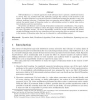Free Online Productivity Tools
i2Speak
i2Symbol
i2OCR
iTex2Img
iWeb2Print
iWeb2Shot
i2Type
iPdf2Split
iPdf2Merge
i2Bopomofo
i2Arabic
i2Style
i2Image
i2PDF
iLatex2Rtf
Sci2ools
CORR
2010
Springer
2010
Springer
Self-stabilization with Byzantine tolerance for global tasks
Self-stabilization is a versatile approach to fault-tolerance since it permits a distributed system to recover from any transient fault that arbitrarily corrupts the contents of all memories in the system. Byzantine tolerance is an attractive feature of distributed systems that permits to cope with arbitrary malicious behaviors. Combining these two properties proved difficult: it is impossible to contain the spatial impact of Byzantine nodes in a self-stabilizing context for global tasks such as tree orientation and tree construction. We present and illustrate a new concept of Byzantine containment in stabilization. Our property, called Strong Stabilization enables to contain the impact of Byzantine nodes if they actually perform too many Byzantine actions. We derive impossibility results for strong stabilization and present strongly stabilizing protocols for tree orientation and tree construction that are optimal with respect to the number of Byzantine nodes that can be tolerated in ...
| Added | 09 Dec 2010 |
| Updated | 09 Dec 2010 |
| Type | Journal |
| Year | 2010 |
| Where | CORR |
| Authors | Swan Dubois, Toshimitsu Masuzawa, Sébastien Tixeuil |
Comments (0)

